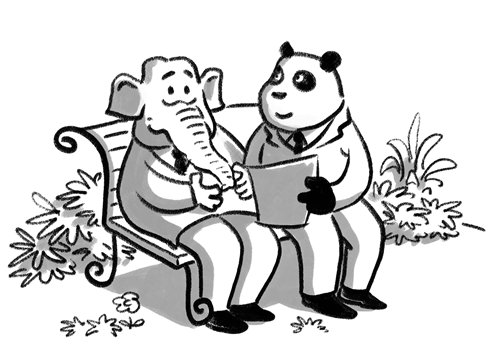
Illustration: Liu Rui/GT
Opposition candidate Ibrahim Mohamed Solih won the Maldives' presidential election on Monday with 134,616 votes, defeating incumbent President Abdulla Yameen who received 96,132 votes. In a statement, India's foreign ministry congratulated Solih, saying, "This election marks not only the triumph of democratic forces in the Maldives, but also reflects the firm commitment to the values of democracy and the rule of law." This may be an allusion to the Yameen administration's arrest and detention of opposition members and court judges over the past year, an act deemed by the West and India to undermine democracy and the rule of law. The Indian statement made clear its support for Solih and aversion to the president. Many Western media outlets say the defeat of a "pro-China" president will deal a blow to Beijing.
During Yameen's presidency, the Maldives and China cooperated on major projects like China-Maldives Friendship Bridge and the Male International Airport expansion that is underway. Yameen had asked India to withdraw its military helicopters and personnel posted on the island nation. He was thus called a China-backed president who was tough on India. But the truth is that the Yameen government chose to cooperate with China in the interest of Maldives' development and to create tangible benefits for the people.
As a tiny archipelago nation in the Indian Ocean, the Maldives has close connections with India. The Yameen government had wanted economic cooperation with China to develop the economy through external resources, not because it wanted to take an anti-India stance. After declaring a state of emergency in the Maldives on February 5, Yameen sent a special envoy to New Delhi to explain what happened, showing his respect for India, the regional power, though New Delhi refused to entertain the envoy. India had intervened in Maldives' domestic politics by sending troops. Although New Delhi was dissatisfied with Yameen declaring a state of emergency and there was discussion in India about whether to intervene again, the Indian government finally chose not to. The latest election, as anticipated by India, proves that its decision not to intervene was right.
Some Western media outlets say Solih's victory deals a potential blow to China and he will likely adopt an anti-China stance. However, mainly domestic political factors were behind the election results. For instance, with opposition leaders and judges arrested by the Yameen government, the opposition party got united amid public concerns about damage to democracy and the rule of law. Foreign policy on China and India did not take center stage during the election. Neither did Solih and the opposition make any remarks hostile to China during the campaign. China and the Maldives have enjoyed sound ties. China doesn't interfere in Maldives' internal affairs and bilateral collaboration serves the national interests of the Indian Ocean nation. That said, whoever takes the presidency, China-Maldives friendly ties will remain.
In fact, it shouldn't be a one-or-the-other game for China and India in the Maldives. China invests in the Maldives as it is needed by the nation, a normal cooperative practice between two countries. China neither has the intention nor the need to shut out India on the archipelago. In the meantime, the Maldives may lend priority to India in its foreign relations, but won't constrain itself to India. Their disagreement is a bilateral issue that has nothing to do with China. In the 21st century, the Maldives is entitled and needs to develop relations with all other nations. In fact, the building of infrastructure by China in the Maldives has created favorable conditions for the business and personnel of Indian companies on the island country. China and India can actually help boost Maldives' development by using their own strengths.
Beijing has come up with a constructive "two-plus-one" mechanism - China and India plus another South Asian country - as a demonstration of sincerity. The mechanism can not only enhance mutual trust between China and India, but prevent other South Asian countries from being caught in between. This aims to harmonize relations between countries and serves the interest of all relevant parties, and is worth a careful consideration by New Delhi. Perhaps the two powers can have a try in the Maldives first.
The author is director of the Center for Indian Studies at China West Normal University and a senior research fellow with The Charhar Institute. opinion@globaltimes.com.cn
